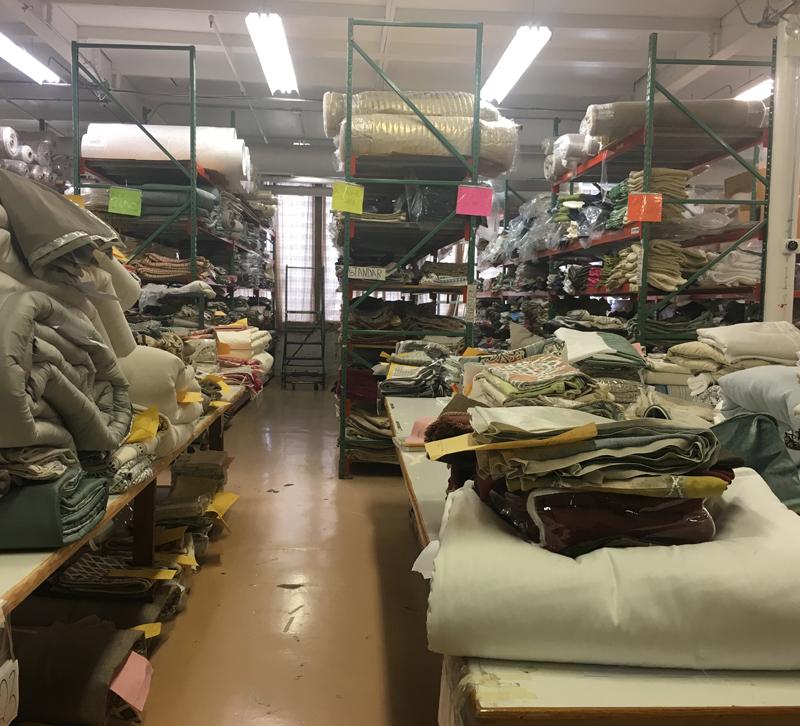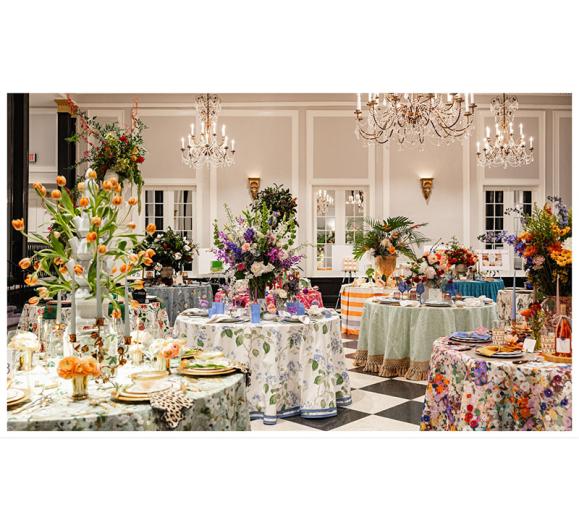The Eastern Accents facility sits on a quiet section of Belmont Avenue on the northwest side of Chicago. On the outside, the factory appears ordinary and unassuming. Inside, however, a flurry of activity, innovation and production thrives.
Founded in 1989 by husband-and-wife team Ridvan and Siw Tatargil, Eastern Accents manufacturers an array of soft goods from pillows to bedding to curtains all in its 230,000-square-foot facility. The company produces its own line of soft goods as well as private labels for Frontgate, Neiman Marcus and other well-known retailers. In addition to soft goods, Eastern Accents also manufacturers its own beds and handles the casegoods production for Port 68.
Eastern Accents welcomes visitors who want to tour the facility, so we took them up on that offer and toured the factory with product designer Sarah Montgomery. Get an inside look at how this U.S. manufacturer is staying on-trend and nimble.
A change in client needs
When Montgomery first started with Eastern Accents six and a half years ago, most clients still pined for the traditional bedding look — an unwashable duvet and the pile of pillows on top. Nowadays, the traditional look just isn't selling. As Millennials start to buy more and more bedding, Eastern Accents customers want washable fabrics to meet Millennial demands.
"Therefore we not only have to change the way the product looks," she explains, "but also the way we sell it and looking at sales in a different way.”
Eastern Accents isn't the only one seeing this trend take off. As we reported in the February issue, performance fabrics could not be missed at the December Showtime market, and the category has grown exponentially in popularity as American living has changed. More and more consumers are clamoring for fabrics designed to resist stains, hold up in the washing machine and withstand the elements.
For Montgomery, this side of the business continues to grow and change, and the company is looking for new ways to meet this demand. She says the owners have a can-do attitude, and if they can produce something in-house rather than ordering it, they often will try to do so.
Never settle for less
At their facility in Chicago, Eastern Accents splits up its production in half — half for its own label and licensed collections and half for private labels like Nieman Marcus. That often fluctuates depending on demand and new orders from new clients, and Montgomery says the company works hard to create a rounded portfolio.
Case in point: Celerie Kemble. Eastern Accents brought her in to add a feminine touch to the existing collections with Thom Filicia and Barclay Buttera. According to Montgomery, her collection does especially well in Florida (also see her new Arteriors collection on page 12 here).
One of the biggest issues the company has had to contend with in the last few years is determining which retailers to work with. The company currently has private label contracts with Frontgate, Neiman Marcus and a few other retailers, but they have had to turn down contracts with other retailers who couldn't meet their price point.
Eastern Accents sources materials from U.S.-based companies as well as those in Italy, Portugal and Turkey, where the owners are originally from and have contacts. Because of the high quality of their products and the costs of manufacturing in the U.S., their price point puts them too far above where other retailers want them to be. Though it can be hard to turn down work, Montgomery says the owners have a good understanding of their company's capabilities and know when the work is just not doable for them.
"The more they do it," she says, "the more they know who they can work with."
Global sources, local manufacturing
In our April issue, we covered what manufacturing looks like in the post-globalized economy. While the manufacturers we spoke with wanted to keep jobs in the U.S., Brad Sewell, CEO of Campaign Living, touched on an interesting point: not everything has to be Made-in-the-USA and it shouldn't be.
The beauty of globalization is that it allows for the trading of cultures and styles across the world. Eastern Accents buys trim from Italy, Germany and Portugal, and many of its textiles come from mills in the U.S. as well as print shops in the U.K. The owners also use their contacts in Turkey whenever possible.
"While we don’t design the fabrics," Montgomery explains, "we work with so many mills, and we buy quantity so we can do custom stuff.”
At High Point especially, people from all over the world work in the showroom, and Montgomery says it's not uncommon to hear six different languages being spoken in the same conversation. People from all backgrounds and nationalities work for the company, and it is the owners' ability to think outside the box that keeps the company evolving and adapting. At the moment, Ridvan Tatargil is buying up more properties in High Point and opening Eastern Accents up to new possibilities and new revenue streams.
As Montgomery says, "He’s not afraid to take risks."







